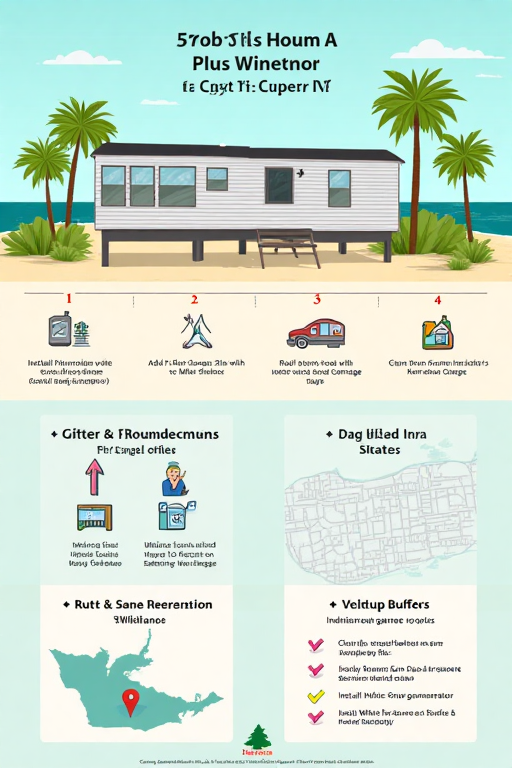Mobile Home Septic System Basics in Rural South Carolina
Your Comprehensive Guide from Faith Mobile Home Solutions
Introduction
Rural South Carolina offers a unique setting for mobile home living, where the charm of the countryside meets affordable housing options. However, one critical aspect of owning a mobile home in a rural area is managing its septic system. A properly functioning septic system is vital to the health, comfort, and longevity of your mobile home. In this comprehensive guide, we delve into the basics of mobile home septic systems, how they work, and the best practices to ensure they stand the test of time in South Carolina’s challenging rural climate.
This guide is designed for mobile home owners who want to understand every detail of their septic system—from its essential components and installation to routine maintenance, troubleshooting common issues, and planning for upgrades. We will also cover cost factors, financing options, legal requirements, and expert tips to help you keep your system operating efficiently and extend the overall lifespan of your mobile home.
Whether you are new to mobile home ownership or looking to update an older system, the strategies outlined in this guide will help you protect your investment, ensure environmental safety, and maintain a comfortable living environment. Let’s explore the fundamentals of mobile home septic systems and discover practical tips to manage them effectively in rural South Carolina.
Understanding Septic Systems
A septic system is a self-contained, underground wastewater treatment solution typically used in rural areas where municipal sewer systems are unavailable. In mobile homes, the septic system is responsible for processing household wastewater, separating solids from liquids, and safely dispersing the treated effluent into a drainfield.
How Septic Systems Work
At its core, a septic system consists of three main parts:
- The Septic Tank: A watertight container where wastewater flows from the home. Here, solids settle to the bottom (sludge) and oils and grease float to the top (scum), while the liquid effluent flows out to the drainfield.
- The Drainfield: Also known as the leach field, this area allows the effluent to percolate through the soil, where natural processes remove harmful bacteria and viruses.
- Soil and Environment: The soil plays a crucial role in treating the effluent through natural filtration and microbial action. The system’s effectiveness depends on soil type, permeability, and proper maintenance.
Understanding how your septic system operates is essential to maintaining its efficiency and prolonging its lifespan.
Key Components of a Mobile Home Septic System
To ensure optimal performance, it is important to be familiar with the critical components of your septic system and how they work together.
The Septic Tank
The septic tank is the heart of the system. It is where initial wastewater treatment occurs. Over time, solids settle, and the system must be pumped to remove accumulated sludge. Regular pumping is vital to prevent system overload and failure.
The Drainfield
The drainfield is where the liquid effluent is distributed into the soil for further treatment. Its performance depends on proper sizing, soil conditions, and regular maintenance to prevent clogging and system failure.
Distribution Box (if applicable)
Some septic systems include a distribution box that evenly distributes effluent to the drainfield. Ensuring that the distribution box is functioning correctly is crucial for uniform treatment across the entire field.
Piping and Inlet/Outlet Systems
The network of pipes that carries wastewater between the mobile home, septic tank, and drainfield must be kept clear and in good repair. Cracked or clogged pipes can lead to system backup and environmental hazards.
Each component plays a vital role in maintaining a healthy septic system. Understanding their functions helps you identify potential issues and take preventative measures.
Installation & Design Considerations
Proper installation is the cornerstone of a reliable septic system. In rural South Carolina, several factors must be considered during the design and installation phase to ensure that your septic system operates efficiently for years to come.
Site Evaluation and Soil Testing
Before installation, a thorough site evaluation and soil test are essential. Soil permeability, pH levels, and the presence of natural water tables influence the design of your septic system. A well-conducted soil test helps determine the appropriate size of the septic tank and drainfield.
System Design and Sizing
The design of your septic system should be tailored to your household’s wastewater output. Proper sizing of the septic tank and drainfield is critical to avoid overloading the system, which can lead to premature failure and costly repairs.
Regulatory Compliance
In South Carolina, septic system installation is subject to local and state regulations. It is important to obtain the necessary permits, adhere to building codes, and work with licensed professionals to ensure that your installation meets all legal requirements.
A well-designed and properly installed septic system provides a solid foundation for long-term performance and minimizes future maintenance challenges.
Routine Maintenance & Inspections
Regular maintenance is essential to prolong the lifespan of your mobile home septic system. A proactive approach to maintenance not only prevents costly repairs but also safeguards your home’s environmental impact.
Septic Tank Pumping
It is generally recommended to pump your septic tank every 3-5 years, depending on usage and the size of your system. Regular pumping prevents sludge buildup that can clog the system and cause backups.
Drainfield Care
Keep the drainfield clear of heavy vehicles, structures, and excessive vegetation. Proper landscaping and regular inspections ensure that the drainfield remains effective and unclogged.
Routine System Inspections
Schedule annual inspections by a certified professional to assess the overall condition of your septic system. Inspections can identify potential issues such as leaks, pipe blockages, or early signs of system failure.
Maintenance Best Practices
Maintain a record of all inspections, pumpings, repairs, and upgrades. Keeping detailed records helps you track the system’s performance and provides documentation for any future service or sale of your mobile home.
Adopting a regular maintenance schedule is critical to ensuring the longevity and reliability of your septic system.
Troubleshooting Common Septic System Issues
Even with proper maintenance, septic systems can encounter issues. Understanding common problems and knowing how to address them promptly is key to avoiding system failure.
Clogging and Drainfield Failure
Clogging in the drainfield can result from excessive sludge, root intrusion, or physical damage. Symptoms include slow drainage, foul odors, and pooling water on the surface. Regular pumping and proper landscaping can help prevent these issues.
Leaks and Pooling
Leaks in the septic tank or distribution pipes can cause water pooling and contamination of the surrounding soil. Identifying leaks early through regular inspections can save you from costly repairs and potential environmental hazards.
System Overload
An overloaded system, often due to increased water usage or an undersized septic tank, can lead to backups and premature system failure. Monitoring water usage and scheduling timely pump-outs are essential steps in preventing overload.
Odor Issues
Foul odors can indicate a malfunctioning system. Causes may include septic tank imbalance, clogged pipes, or a failing drainfield. Addressing odor issues promptly is important to maintain a healthy living environment.
By familiarizing yourself with common septic system issues, you can take swift action to troubleshoot and resolve problems, ensuring your system remains in top working order.
Upgrades & Efficiency Improvements
Beyond routine maintenance, certain upgrades can enhance the efficiency and lifespan of your septic system. These improvements not only boost performance but also contribute to environmental sustainability and property value.
Advanced Monitoring Systems
Consider installing sensors or smart monitoring systems that track water levels, pump efficiency, and system performance in real time. This technology enables early detection of issues, allowing you to address them before they escalate.
Eco-Friendly Upgrades
Energy-efficient pumps, solar-powered components, and environmentally friendly treatment additives can improve the sustainability of your septic system. These upgrades often qualify for state or federal incentives and reduce operating costs.
Drainfield Enhancements
Upgrading the drainfield by adding filtration layers or advanced distribution systems can improve the efficiency of wastewater treatment and extend the system’s lifespan.
Regular System Modernization
As technology advances, newer septic systems incorporate improved designs and materials. While a complete system replacement may not be necessary, incremental upgrades can ensure that your system remains competitive and efficient.
Investing in upgrades not only protects your septic system but also adds value to your mobile home, making it more attractive to future buyers.
Cost & Financing Considerations
Understanding the costs associated with septic system installation, maintenance, and upgrades is crucial for budgeting and financing your mobile home investment. This section provides a detailed breakdown of the financial aspects.
Initial Installation Costs
Installation costs vary depending on the size of the system, soil conditions, and local regulations. Key cost factors include:
- Excavation and site preparation
- Septic tank and drainfield installation
- Labor and permits
- Material costs
Ongoing Maintenance Expenses
Regular septic tank pumping, inspections, and minor repairs are essential expenses to consider. Over time, preventive maintenance can save you from costly emergency repairs.
Financing Options
If upfront costs are a concern, various financing options are available. These include personal loans, home improvement loans, and sometimes state or federal assistance programs for rural housing improvements.
Evaluating these costs and financing options helps ensure that your septic system investment remains affordable and contributes positively to your mobile home’s overall value.
Legal & Regulatory Considerations
Compliance with local and state regulations is critical to the success of your septic system. In South Carolina, septic system installations and upgrades are subject to various permits, codes, and environmental regulations.
Permitting and Zoning
Before installing or upgrading a septic system, obtain the necessary permits from your local health department or county office. Adhere to zoning laws and building codes to ensure that your system is legal and safe.
Environmental Regulations
Septic systems must be designed and maintained in a way that protects local water sources and soil quality. Familiarize yourself with South Carolina’s environmental regulations to avoid fines and ensure your system is environmentally friendly.
Record Keeping and Documentation
Keep detailed records of all installations, inspections, repairs, and maintenance activities. These documents are crucial for regulatory compliance, insurance claims, and potential future resale of your mobile home.
Working with experienced professionals and staying informed about legal requirements is essential for maintaining a compliant and efficient septic system.
Expert Tips from Faith Mobile Home Solutions
Our experts at Faith Mobile Home Solutions have extensive experience managing mobile home septic systems in rural South Carolina. Here are our top tips to help you extend the lifespan of your septic system and protect your investment:
Establish a Regular Maintenance Schedule
Regular maintenance is the foundation of a long-lasting septic system. Create a schedule that includes daily, monthly, and annual tasks, and stick to it diligently.
Invest in Quality Upgrades
When upgrading your system, choose high-quality materials and energy-efficient components. These investments may have higher upfront costs but will save money and improve performance over time.
Monitor System Performance
Install smart monitoring devices that alert you to potential issues such as high water levels or pump failures. Early detection can prevent major repairs and extend the system’s lifespan.
Work with Certified Professionals
Engage certified inspectors, contractors, and environmental consultants to ensure that your septic system is installed and maintained according to best practices and regulatory standards.
Stay Informed on Local Regulations
Keep abreast of changes in local building codes, zoning laws, and environmental regulations that may affect your septic system. Regular updates help you remain compliant and avoid penalties.
Document Everything
Maintain comprehensive records of all maintenance, upgrades, and inspections. Detailed documentation is not only useful for regulatory compliance but also increases your mobile home’s resale value.
Implementing these expert tips will help you manage your mobile home septic system effectively, ensuring its longevity and protecting your investment in rural South Carolina.
Conclusion: Maximize Your Mobile Home’s Lifespan with Proactive Septic System Care
Ensuring the longevity of your mobile home in rural South Carolina hinges on the proper maintenance and management of your septic system. By understanding the challenges posed by the local climate, following a rigorous maintenance schedule, investing in quality upgrades, and staying compliant with legal and regulatory requirements, you can protect your investment and enjoy a safe, comfortable home for years to come.
This comprehensive guide from Faith Mobile Home Solutions has provided you with detailed insights into every aspect of mobile home septic system care—from understanding the system’s components and installation to regular maintenance, troubleshooting, and upgrades. We hope that the strategies and expert tips outlined here empower you to take proactive steps in preserving and enhancing the value of your mobile home.
Thank you for choosing Faith Mobile Home Solutions as your trusted resource. We wish you a long, healthy, and prosperous future with your mobile home!
Frequently Asked Questions (FAQs)
1. What is a septic system?
A septic system is an on-site wastewater treatment system that processes and disperses household wastewater when municipal sewer systems are unavailable.
2. How does a septic system work in a mobile home?
Wastewater flows from the mobile home into a septic tank, where solids settle and liquids are distributed into a drainfield for natural filtration.
3. How often should I pump my septic tank?
It is typically recommended to pump your septic tank every 3-5 years, depending on usage and system size.
4. What are the most common problems with septic systems?
Common issues include clogs, leaks, drainfield failure, and buildup of sludge and scum that can lead to system overload.
5. How can I tell if my septic system is failing?
Signs of failure include slow drains, foul odors, pooling water in the drainfield, and frequent backups in the mobile home.
6. What maintenance tasks are essential for a septic system?
Regular pumping of the septic tank, cleaning gutters, inspecting the drainfield, and monitoring water usage are crucial maintenance tasks.
7. How can energy-efficient upgrades improve my septic system’s performance?
Energy-efficient upgrades such as improved insulation and efficient plumbing fixtures reduce water usage and protect the system from overload.
8. Are there any smart monitoring systems for septic systems?
Yes, there are smart sensors available that monitor water levels and system performance, alerting you to potential issues early.
9. What role does soil play in septic system effectiveness?
Soil quality and permeability are critical for proper effluent treatment in the drainfield, influencing the system’s overall performance.
10. Can regular inspections prevent septic system failures?
Yes, routine professional and self-inspections can detect early signs of problems, allowing for timely repairs and maintenance.
11. What upgrades can enhance the longevity of a septic system?
Upgrades such as advanced monitoring systems, improved drainfield design, and high-quality pumps can extend system life and efficiency.
12. How do I know if my septic system is compliant with local regulations?
Regular inspections and consultations with local health or environmental agencies can confirm compliance with state and local standards.
13. What are the benefits of proper septic system maintenance?
Proper maintenance prevents costly repairs, extends the system’s lifespan, improves home value, and protects the environment.
14. How can I reduce water usage to protect my septic system?
Install water-saving fixtures, fix leaks promptly, and consider using a smart water monitoring system to keep usage in check.
15. Are there government incentives for septic system upgrades?
Some local and state programs offer incentives or rebates for energy-efficient and eco-friendly septic system upgrades.
16. How important is proper landscaping around the drainfield?
Landscaping that promotes proper drainage and prevents root intrusion is essential for maintaining a healthy drainfield.
17. Can I install a new septic system myself?
Septic system installation should be performed by licensed professionals to ensure compliance with regulations and proper functionality.
18. What factors influence the lifespan of a septic system?
Key factors include the quality of installation, maintenance practices, soil conditions, and the level of household water usage.
19. How do I budget for septic system maintenance?
Include regular pumpings, inspections, and minor repairs in your annual budget to avoid unexpected expenses.
20. What are the signs that my septic system needs upgrading?
Signs include frequent backups, slow drains, persistent odors, and visible pooling of water near the drainfield.
21. Can smart home technology be integrated with septic systems?
Yes, smart monitoring devices can track system performance, alert you to issues, and help manage water usage effectively.
22. How do energy audits help with septic system maintenance?
Energy audits identify inefficiencies in water and energy use, guiding targeted improvements that can reduce system strain.
23. What impact does regular septic system maintenance have on property value?
A well-maintained septic system enhances the overall health of your property and can significantly increase resale value.
24. How can I find a certified septic system inspector?
Ask for referrals from local health departments, real estate agents, or consult professional directories to find certified inspectors in your area.
25. Where can I find more information on mobile home septic system care?
For additional resources, visit Faith Mobile Home Solutions, local government websites, and industry publications focused on septic systems and rural home maintenance.
Additional Keywords
- mobile home longevity
- mobile home maintenance
- rural septic system
- mobile home septic care
- South Carolina septic systems
- Faith Mobile Home Solutions
- mobile home wastewater
- septic tank pumping
- drainfield maintenance
- septic system upgrades
- energy efficient septic
- mobile home inspections
- septic system troubleshooting
- septic system design
- mobile home drainfield
- septic system repair
- mobile home water management
- septic system efficiency
- smart septic monitoring
- mobile home plumbing
- septic system cost
- septic system financing
- mobile home environmental care
- septic system regulatory compliance
- mobile home maintenance FAQ




